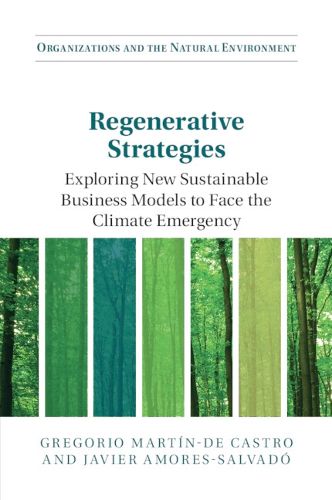Readings Newsletter
Become a Readings Member to make your shopping experience even easier.
Sign in or sign up for free!
You’re not far away from qualifying for FREE standard shipping within Australia
You’ve qualified for FREE standard shipping within Australia
The cart is loading…






In the current climate emergency, it is no longer enough for businesses to simply employ environmental strategy typologies focused on 'greening the business' and maintaining the 'business-as-usual' logic. Gregorio Martin-de Castro and Javier Amores-Salvado argue that disruptive business models and solutions are now required, and they propose a new regenerative strategy linking climate science to management studies. The main features of this strategy are:cutting-edge climate science solutions (capturing and utilizing atmospheric carbon dioxide to produce net-zero or net-negative emissions and positive environmental externalities) and a redefined firm purpose under an ecological, ethical and moral paradigm (integrating ecoemotional wealth, environmental performance, systemic socioecological resilience, wider stakeholder management and a very long-term perspective). They demonstrate that, by applying this strategy, companies can not only reduce their negative environmental externalities and create positive environmental externalities, but also reverse current environmental degradation through a new sustainable capitalism.
$9.00 standard shipping within Australia
FREE standard shipping within Australia for orders over $100.00
Express & International shipping calculated at checkout
In the current climate emergency, it is no longer enough for businesses to simply employ environmental strategy typologies focused on 'greening the business' and maintaining the 'business-as-usual' logic. Gregorio Martin-de Castro and Javier Amores-Salvado argue that disruptive business models and solutions are now required, and they propose a new regenerative strategy linking climate science to management studies. The main features of this strategy are:cutting-edge climate science solutions (capturing and utilizing atmospheric carbon dioxide to produce net-zero or net-negative emissions and positive environmental externalities) and a redefined firm purpose under an ecological, ethical and moral paradigm (integrating ecoemotional wealth, environmental performance, systemic socioecological resilience, wider stakeholder management and a very long-term perspective). They demonstrate that, by applying this strategy, companies can not only reduce their negative environmental externalities and create positive environmental externalities, but also reverse current environmental degradation through a new sustainable capitalism.